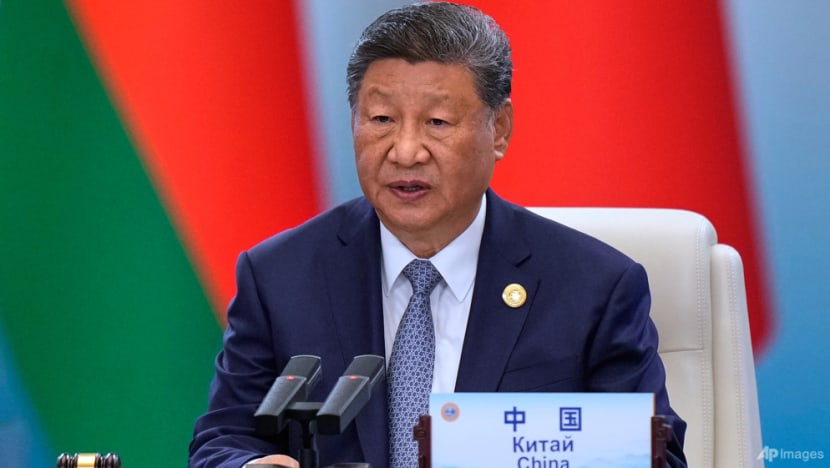World
Xi Jinping Advocates Global Governance Reform at SCO Summit

Chinese President Xi Jinping has proposed an ambitious vision for reforming global governance, emphasizing the need for a fairer and more reasonable system. Speaking at the Shanghai Cooperation Organization (SCO) summit on September 1, 2023, in Tianjin, Xi characterized the current global landscape as being at a critical juncture, reminiscent of the period following the establishment of the United Nations 80 years ago, which was aimed at preventing further global conflicts.
Xi highlighted persistent challenges such as Cold War mentalities, hegemonism, and protectionism, noting that the world is entering a new era marked by “turbulence and transformation.” His comments resonate amid ongoing wars in Ukraine and the Middle East, as well as rising tensions between China and the United States, which Beijing perceives as increasingly unilateral.
In his address to SCO member states and partners, Xi stated, “History tells us that the more difficult the times, the more we must hold fast to the original aspiration of peaceful coexistence.” He called for collective action to establish a Global Governance Initiative (GGI), which aims to foster cooperation among nations to build a more equitable international framework.
Key Priorities of the Global Governance Initiative
The Global Governance Initiative is the fourth major international proposal from Xi since 2021, following the Global Development Initiative, Global Security Initiative, and Global Civilization Initiative. Under the new initiative, Xi outlined five key priorities: upholding sovereign equality, respecting international law, practicing multilateralism, prioritizing people, and focusing on action-oriented results.
“All countries, regardless of size, strength, or wealth, should equally participate in, decide on, and benefit from global governance,” he stated. Xi emphasized the necessity of applying international law without double standards and rejected the imposition of rules by a select few nations.
Xi urged the SCO to take a leading role in implementing the GGI and highlighted the bloc’s previous contributions to global governance discussions. The SCO, established in 2001, consists of major players such as China, Russia, India, Pakistan, Iran, and Central Asian nations, with Belarus as its newest member. The organization has expanded its focus from regional security to encompass economic and cultural cooperation.
Economic Cooperation and Future Initiatives
In his speech, Xi urged SCO members to pursue non-alignment and non-confrontation, emphasizing the importance of stability in the face of security threats. He called for the dismantling of economic barriers and encouraged deeper collaboration on projects related to the Belt and Road Initiative.
Xi also announced plans for new cooperation platforms focused on energy, green industries, and the digital economy. Over the next five years, China aims to enhance its solar and wind power capacity in collaboration with its SCO partners. “China is ready to share the opportunities of its super-sized market,” he said, reiterating the country’s commitment to high-quality economic and trade cooperation.
Furthermore, Xi pledged to support health initiatives within SCO countries, including 500 congenital heart disease treatments, 5,000 cataract surgeries, and 10,000 cancer screenings over the next five years. He encouraged member states to foster cultural exchanges and work together to promote harmony and coexistence.
During the summit, leaders signed a joint declaration that affirms their commitment to deeper security, economic, and cultural cooperation, while also endorsing a development strategy for the next decade. The declaration established four permanent centres aimed at addressing security threats, organized crime, cyber risks, and narcotics.
The SCO members reaffirmed their support for the United Nations’ central role in global affairs and rejected bloc-based confrontations and unilateral economic sanctions. The summit also welcomed Laos as a new dialogue partner and announced that Kyrgyzstan will assume the SCO’s rotating chairmanship following China’s tenure.
As the global landscape continues to evolve, Xi’s advocacy for a reformed approach to governance and cooperation reflects both the challenges and opportunities facing nations today.
-

 Business5 months ago
Business5 months agoKenvue Dismisses CEO Thibaut Mongon as Strategic Review Advances
-

 Lifestyle4 months ago
Lifestyle4 months agoHumanism Camp Engages 250 Youths in Summer Fest 2025
-

 Sports4 months ago
Sports4 months agoDe Minaur Triumphs at Washington Open After Thrilling Comeback
-

 Sports5 months ago
Sports5 months agoTupou and Daugunu Join First Nations Squad for Lions Clash
-

 Top Stories5 months ago
Top Stories5 months agoColombian Senator Miguel Uribe Shows Signs of Recovery After Attack
-

 World5 months ago
World5 months agoASEAN Gears Up for Historic Joint Meeting of Foreign and Economic Ministers
-

 Health4 months ago
Health4 months agoNew Study Challenges Assumptions About Aging and Inflammation
-

 Business5 months ago
Business5 months agoOil Prices Surge Following New EU Sanctions on Russia
-

 Entertainment4 months ago
Entertainment4 months agoDetaşe-Sabah Violin Ensemble Captivates at Gabala Music Festival
-

 Entertainment4 months ago
Entertainment4 months agoBaku Metro Extends Hours for Justin Timberlake Concert
-

 Top Stories5 months ago
Top Stories5 months agoRethinking Singapore’s F&B Regulations Amid Business Closures
-

 Business5 months ago
Business5 months agoU.S. House Approves Stablecoin Bill, Sends to Trump for Signature









